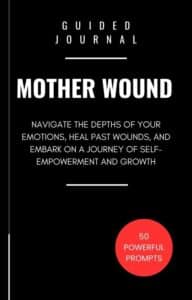In the journey of self-discovery, there are hidden corners of our hearts that hold the echoes of our past. For many, the relationship with our mothers is at the core of our emotional landscape. The Mother Wound, a term coined by author and therapist Bethany Webster, refers to the pain and unresolved issues that arise from the complex dynamics between mothers and daughters. This profound and often unspoken wound can shape our beliefs, choices, and relationships, impacting us on a deep emotional level.
If you find yourself yearning for healing, understanding, and emotional exploration, journaling can be a powerful tool. It offers a safe and sacred space to excavate the layers of your Mother Wound, unravel its complexity, and embark on a journey towards healing and self-empowerment. Through the art of journaling, you can delve into the depths of your emotions, confront your fears, and rewrite the narratives that have shaped your perception of yourself and your relationships.
In this article, we present you with 50 soul-stirring journal prompts specifically designed to guide you on your path of Mother Wound healing and deep emotional exploration. These prompts will encourage you to dive into the depths of your experiences, untangle the knots of your emotions, and gain a new perspective on your journey. Whether you are just beginning to explore your Mother Wound or have been on this healing journey for some time, these prompts will serve as powerful catalysts for self-reflection and growth.
So, grab your journal, find a quiet space, and allow yourself to be vulnerable as you embark on this transformative journey of self-discovery. The pages of your journal will become a canvas for your emotions, a sanctuary for your healing, and a testament to your resilience. Let the healing begin.
The Mother Wound: Understanding and Healing Emotional Struggles
Welcome to a deep exploration of a universal yet often misunderstood concept called the “Mother Wound.” In this chapter, we will shed light on what the Mother Wound is, how it can manifest in our lives, and provide relatable examples to help you understanding the Mother Wound which is a crucial step towards healing emotional struggles and fostering self-growth.
Defining the Mother Wound
The Mother Wound refers to the emotional pain and unresolved issues that arise from the complex relationship between a person and their mother or mother figure. It encompasses the deep-seated feelings of abandonment, rejection, inadequacy, or unmet needs experienced in childhood or throughout one’s life. The Mother Wound can result from various factors such as neglect, lack of emotional attunement, physical or emotional abuse, or even unintentional actions that shape our perception of ourselves and our relationships.
Manifestations of the Mother Wound
Self-Esteem and Self-Worth: The Mother Wound can impact our self-esteem, leading to feelings of unworthiness, self-doubt, and the constant need for external validation. We may struggle with setting boundaries, asserting ourselves, or feeling deserving of love and success.
Example: Sarah grew up with a critical and emotionally distant mother. As a result, she constantly seeks approval from others, struggles with self-doubt, and finds it challenging to pursue her dreams, fearing judgment and failure.
Relationships and Intimacy: The Mother Wound can affect our ability to form healthy and fulfilling relationships. We may attract partners who replicate the same patterns of emotional unavailability or experience difficulty in trusting others.
Example: Mark grew up with an emotionally absent mother. As an adult, he finds himself repeatedly drawn to partners who are emotionally distant, perpetuating a cycle of unfulfilling relationships and a fear of intimacy.
Self-Identity and Self-Expression: The Mother Wound can hinder our ability to develop a strong sense of self and express our authentic emotions and desires. We may struggle with asserting our needs, speaking up, or feeling confident in who we are.
Example: Emma grew up with a controlling and overbearing mother. As an adult, she finds it challenging to assert her boundaries and express her true desires, constantly second-guessing herself and feeling guilty for prioritizing her own needs.
Healing the Mother Wound
Self-Awareness: Recognizing and acknowledging the presence of the Mother Wound is the first step towards healing. Explore your emotions, reflect on your relationship with your mother, and examine how it has impacted your life.
Compassion and Forgiveness: Cultivate self-compassion and understand that your mother may have had her own wounds and limitations. Practice forgiveness, not for the sake of excusing the past, but to release yourself from the burden of resentment and anger.
Seek Support: Consider therapy or support groups to help navigate the healing process. A trained professional can provide guidance, tools, and a safe space to explore and heal the Mother Wound.
The Mother Wound is a powerful concept that can deeply impact our emotional well-being and relationships. By understanding its manifestations and taking proactive steps towards healing, we can break free from the cycle of pain and create a healthier, more fulfilling life. Remember, healing takes time, but the journey towards self-discovery and self-love is worth it.

Journaling: A Transformative Path to Healing the Mother Wound
Whether you are seeking to mend a strained relationship with your mother or seeking solace from past traumas, journaling can be a profound tool for self-discovery, healing, and personal growth. Let us embark on this journey together and uncover the transformative benefits that await you.
Understanding the Mother Wound
Defining the Mother Wound
- The mother wound refers to the emotional pain and unresolved issues that arise from the mother-child relationship.
- It can stem from various factors, such as unmet needs, neglect, emotional or physical abuse, or unfulfilled expectations.
- The mother wound can affect one’s self-esteem, relationships, and overall well-being.
Recognizing the Impact
- The mother wound can manifest in different ways, such as feelings of abandonment, rejection, or inadequacy.
- It may create patterns of behavior and relationship dynamics that perpetuate the wound.
- Understanding the impact of the mother wound is crucial to begin the healing process.
The Power of Journaling
Journaling as a Healing Practice
- Journaling is the act of self-reflection and self-expression through writing.
- It provides a safe and private space to explore your thoughts, emotions, and experiences.
- Through journaling, you can gain insights, release emotions, and gain clarity on your journey of healing.
Unlocking Self-Discovery
- Journaling allows you to explore your innermost thoughts and feelings without judgment.
- It helps you uncover patterns, beliefs, and behaviors rooted in the mother wound.
- By gaining self-awareness, you can begin to untangle and heal from the wounds of the past.
Expressing and Releasing Emotions
- Journaling provides a cathartic outlet for expressing and releasing pent-up emotions.
- It allows you to process and validate your feelings, leading to emotional healing.
- Through journaling, you can find solace, comfort, and a sense of release.
Gaining Perspective and Clarity
- Writing down your experiences and reflections helps you gain perspective on past events.
- It allows you to see situations from a different angle and challenge limiting beliefs.
- Journaling provides clarity, enabling you to make informed choices and take empowered actions.
Techniques for Effective Journaling
Freewriting
- Set a timer for a specific duration and write without pausing or censoring yourself.
- Let your thoughts flow freely, allowing your subconscious mind to emerge.
- Freewriting encourages authenticity and can unveil hidden emotions and insights.
Prompt-Based Journaling
- Use prompts to stimulate reflection and exploration of specific themes or emotions.
- Prompts can be as simple as “What does the mother wound mean to me?” or “How has it affected my relationships?”
- They serve as catalysts for deeper self-discovery and healing.
Dialogue Journaling
- Engage in a written conversation with your inner child or your mother (real or symbolic).
- Write from different perspectives, allowing for a compassionate and healing dialogue.
- Dialogue journaling promotes understanding, forgiveness, and reconciliation.
Nurturing Your Journaling Practice
Create a Sacred Space
- Designate a quiet and comfortable space where you can journal without distractions.
- Surround yourself with items that inspire and soothe you, such as candles, crystals, or soft music.
- Creating a sacred space enhances the sense of safety and support during your journaling practice.
Consistency and Regularity
- Commit to a regular journaling practice, even if it’s just a few minutes each day.
- Consistency allows you to build momentum and fully experience the transformative power of journaling.
- Make journaling a non-negotiable self-care ritual.
Seek Support
- Consider joining support groups or seeking therapy to complement your journaling practice.
- Sharing your journey with others who understand can provide additional insights and emotional support.
- Professional guidance can help navigate complex emotions and facilitate healing.
Dear reader, journaling is not just a simple act of writing; it is a profound journey of self-discovery and healing. By embracing this transformative practice, you have the power to heal the mother wound, nurture your inner self, and cultivate a deeper sense of self-love and acceptance.
Take the first step today, and let the pages of your journal become a sanctuary where you rewrite your story and embark on a path of healing and transformation. The power is in your hands, and the journey awaits you. Happy journaling!

Journal Writing Prompts for Mother Wound
Imagine your ideal mother-daughter relationship. What qualities and characteristics would your mother possess? How would this relationship differ from your current reality?
Write a letter to your mother, expressing your deepest emotions and thoughts about the “mother wound.” What do you wish she understood about the impact it has had on you?
Reflect on the earliest memories you have of your mother. How do these memories shape your perception of her and your relationship with her?
Describe a specific incident or event that exemplifies the “mother wound” in your life. How did it affect you emotionally, and what lessons did you learn from it?
Write a dialogue between your younger self and your mother. Explore the unmet needs and unexpressed emotions that arise in this conversation.
If you could choose a different mother figure from literature, film, or history, who would it be and why? How would this alternate mother figure help heal your “mother wound”?
Reflect on the ways in which you may have internalized the “mother wound.” How has it influenced your self-perception, relationships, and decision-making?
Write a poem or create a piece of artwork that symbolizes the pain and healing associated with the “mother wound.” What colors, shapes, or words would you use to represent these emotions?
Imagine having a heart-to-heart conversation with your mother about the “mother wound.” What would you want to say to her, and how do you envision her response?
Explore the concept of forgiveness in relation to the “mother wound.” Is forgiveness necessary for healing, and what does it mean to forgive in this context?
Write a short story or narrative that explores a fictional character’s experience with the “mother wound.” What lessons can be learned from their journey towards healing?
Reflect on the ways in which your relationship with your mother has influenced your own parenting style or your desire to become a parent.
Explore the societal and cultural expectations placed on mothers and daughters. How do these expectations contribute to the “mother wound” and impact your own experience?
Write a list of qualities and traits that you admire in other mothers. How can you incorporate these positive qualities into your own self-nurturing and self-care practices?
Imagine your life without the “mother wound.” How would your relationships, self-confidence, and overall well-being be different?
Reflect on the role of communication in healing the “mother wound.” What barriers exist in your relationship with your mother, and how can you overcome them to foster healthier communication?
Write a series of affirmations or positive statements about yourself and your worthiness of love and acceptance, independent of the “mother wound.”
Reflect on the ways in which you have sought validation and approval from others due to the “mother wound.” How can you shift towards self-validation and self-acceptance?
Explore the impact of societal stereotypes and expectations on the “mother wound.” How have these external influences shaped your perception of yourself and your mother?
Write a gratitude letter to someone who has served as a positive mother figure in your life. How have they helped you heal and grow?
Reflect on the concept of self-compassion in relation to the “mother wound.” How can you offer yourself the love, understanding, and forgiveness that you may have longed for from your mother?
Write a memoir-style entry capturing a significant memory or moment that reflects the complexities of the “mother wound” and its lingering effects.
Explore the concept of boundaries in relation to the “mother wound.” How can setting and enforcing healthy boundaries contribute to your healing journey?
Reflect on the ways in which the “mother wound” has impacted your sense of identity and self-discovery. How can you reclaim your authentic self?
Write a letter to your younger self, offering comfort, support, and guidance in navigating the challenges of the “mother wound.”
Explore the role of empathy and understanding in healing the “mother wound.” How can you cultivate empathy towards your mother’s own experiences and struggles?
Reflect on the ways in which the “mother wound” has influenced your perception of femininity and womanhood. How can you redefine these concepts on your own terms?
Write a poem or song lyrics that capture the resilience and strength that arise from healing the “mother wound.”
Explore the concept of self-forgiveness in relation to the “mother wound.” How can you release guilt and self-blame for the impact it has had on your life?
Reflect on the ways in which the “mother wound” has influenced your ability to trust and form healthy attachments. How can you cultivate trust in yourself and others?
Write a fictional letter from your future self, describing the healing journey you have undertaken and the lessons you have learned along the way.
Explore the concept of acceptance in relation to the “mother wound.” How can you find peace and acceptance in the reality of your relationship with your mother?
Reflect on the ways in which the “mother wound” has affected your self-worth and self-esteem. How can you nurture and build a strong sense of self apart from external validation?
Write a short story or poem that explores the transformative power of forgiveness and healing in the context of the “mother wound.”
Imagine a dialogue between your present self and your future self, discussing the progress and growth you have made in healing the “mother wound.”
Reflect on the ways in which the “mother wound” has influenced your perception of love and relationships. How can you cultivate healthy and fulfilling connections moving forward?
Write a letter to your inner child, acknowledging the pain and hurt caused by the “mother wound” and offering compassion and reassurance.
Explore the concept of self-care in relation to the “mother wound.” What practices and activities can you engage in to nurture and heal yourself?
Reflect on the ways in which the “mother wound” has influenced your ability to express and receive love. How can you open yourself up to love and vulnerability?
Write a series of journal entries chronicling your healing journey with the “mother wound.” Document the progress, setbacks, and insights gained along the way.
Explore the concept of resilience in relation to the “mother wound.” How have you demonstrated resilience in the face of adversity, and how can you continue to cultivate it?
Reflect on the ways in which the “mother wound” has influenced your relationship with your body and self-image. How can you foster body acceptance and self-love?
Write a letter to your future self, envisioning a life free from the limitations and pain of the “mother wound.” Describe the joy, growth, and fulfillment you hope to experience.
Explore the concept of self-discovery in relation to the “mother wound.” How can you embark on a journey of self-exploration and uncover your true desires and passions?
Reflect on the ways in which the “mother wound” has affected your ability to set and achieve goals. How can you reclaim your sense of agency and pursue your dreams?
Write a list of self-care practices specifically tailored to your healing journey with the “mother wound.” Commit to incorporating at least one practice into your daily routine.
Explore the concept of self-compassion in relation to the “mother wound.” How can you offer yourself the same level of compassion and understanding that you would offer a dear friend?
Reflect on the ways in which the “mother wound” has influenced your ability to trust your own intuition and inner wisdom. How can you reconnect with your intuition and trust yourself?
Write a series of affirmations or positive statements that challenge and reframe the negative beliefs and narratives associated with the “mother wound.”
Imagine a future where you have fully healed from the “mother wound.” Describe the ways in which your life has transformed, and the lessons you carry with you from the healing process.
Download Printable Journal Prompts (PDF) >>
Guided Journal to Heal The Mother Wound
50 Profound Writing Prompts to Navigate the Depths of Your Emotions, Heal Past Wounds, and Embark on a Journey of Self-Empowerment and Growth

Are you tired of carrying the weight of unresolved emotions and unfulfilled expectations? Do you long for a deeper connection with your inner self and healthier relationships? If you’ve experienced the complex and often painful dynamics of the mother-daughter relationship, then you understand the profound impact it can have on your life. Introducing the Guided Journal to Heal The Mother Wound – a transformative tool designed to help you navigate the depths of your emotions, heal past wounds, and embark on a journey of self-empowerment and growth.
The mother wound is a deeply rooted emotional trauma that arises from unmet needs, unaddressed pain, and unfulfilled expectations within the mother-daughter relationship. It manifests as a sense of unworthiness, low self-esteem, self-doubt, and a constant longing for approval. This invisible wound can reverberate in various aspects of your life, affecting your self-expression, your ability to form healthy relationships, and your overall well-being. It’s time to confront the pain and take control of your healing journey.
Imagine the weight of carrying unresolved emotions, the constant battle with self-doubt, and the feeling of being stuck in patterns that no longer serve you. The mother wound can leave you feeling disconnected from your true self, trapped in a cycle of seeking validation and approval. It seeps into your relationships, hindering your ability to trust and form deep connections. Your self-esteem suffers, and you may find it challenging to express your authentic voice. The pain lingers, affecting your happiness and fulfillment.
The Guided Journal to Heal The Mother Wound offers a gentle yet powerful path to reclaiming your authentic self and finding healing and wholeness. Through a series of carefully crafted journaling exercises, prompts, and reflections, this journal acts as your compassionate guide on the journey of self-discovery. It provides a safe and sacred space for you to explore your emotions, confront the pain, and rewrite your story.
Key Benefits:
Self-Exploration: Delve deep into your emotions, uncover the root causes of your pain, and gain a profound understanding of yourself. Through introspective journaling, you’ll uncover hidden patterns, beliefs, and behaviors that have been holding you back.
Emotional Healing: Release trapped emotions, transform limiting beliefs, and heal the wounds that have kept you stuck. The journal prompts gently guide you through the process of forgiveness, self-compassion, and embracing your own worthiness.
Relationship Transformation: Gain insights into the dynamics of the mother-daughter relationship and how it has shaped your own relationships. Discover healthier ways of relating, setting boundaries, and cultivating authentic connections.
Self-Empowerment: Reclaim your voice, your power, and your autonomy. The journaling exercises empower you to express your truth, set intentions, and take inspired action towards a life aligned with your values and desires.
Don’t let the mother wound hold you back any longer. The Guided Journal to Heal The Mother Wound is your invitation to embark on a transformative journey of self-discovery, healing, and empowerment. Embrace the power of journaling as a tool for growth and freedom. Uncover the depths of your emotions, rewrite your narrative, and create a life of authenticity and fulfillment. It’s time to heal, thrive, and reclaim your true self.
As you conclude this sacred journey of Mother Wound healing and emotional exploration, remember that healing is not a destination but a continuous process. The journey of healing the Mother Wound is a testament to your strength, resilience, and commitment to your own well-being.
By engaging in deep self-reflection and utilizing the power of journaling, you have taken significant steps towards understanding and healing your Mother Wound. You have excavated the layers of your emotions, confronted your fears, and reclaimed your power.
Now, as you close your journal and carry the lessons learned with you, remember to be gentle with yourself. Healing takes time, and each step forward is a victory. Embrace the growth you have achieved and continue to nurture your relationship with yourself.
As you move forward, let the lessons learned guide your interactions with others. Share your newfound wisdom, compassion, and vulnerability with those around you. By doing so, you not only contribute to your own healing but also create a ripple effect of healing and empowerment in the world.
So, dear reader, as you embark on the next chapter of your journey, we leave you with a thought-provoking question to ponder: How can you use the lessons learned from healing your Mother Wound to create a more nurturing and empowering relationship with yourself and others?
The answer lies within you, waiting to be discovered and embraced. May your journey be filled with love, healing, and transformation.

